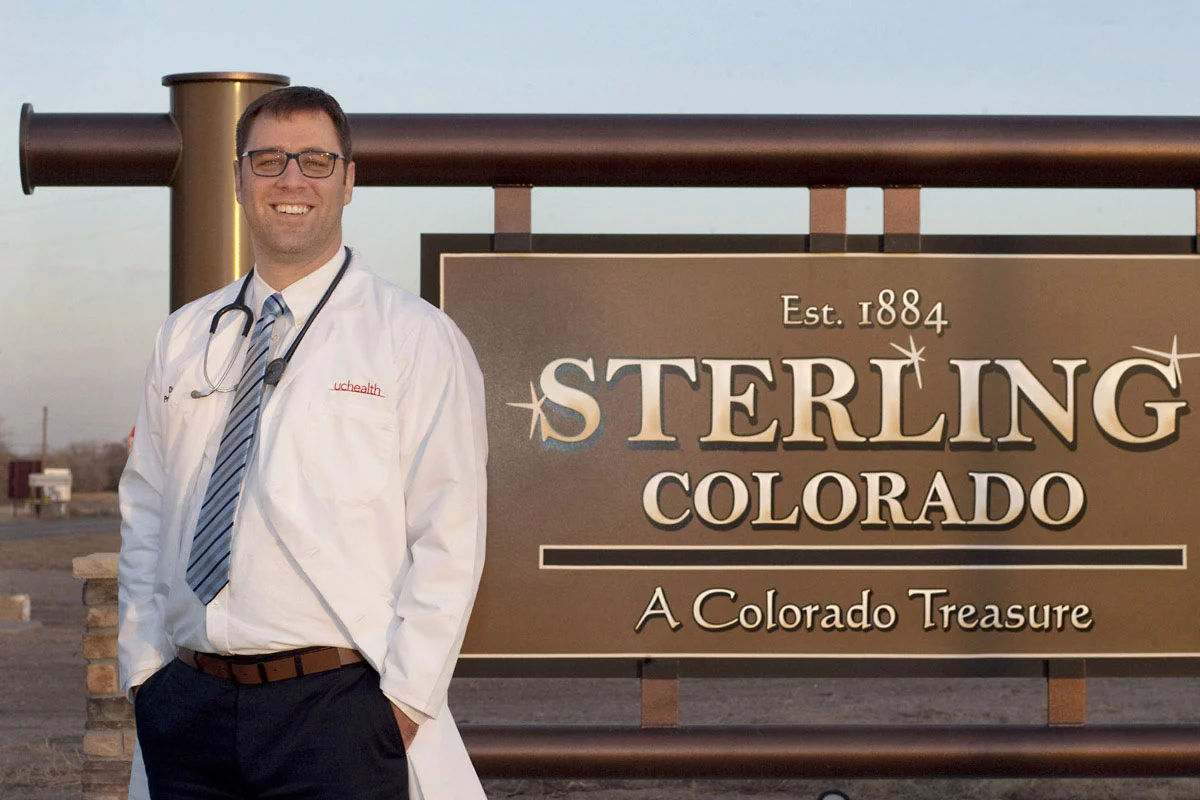
If you’re going to practice medicine in a small town, why not make it your home town? That’s the philosophy of Dr. Daniel Lambrecht, an internal medicine and pediatrics specialist who recently returned to his hometown of Sterling, in northeastern Colorado.
Lambrecht, who is now on staff at the UCHealth Primary Care Clinic – Sterling, is happy to be home and among family.
His parents are from the area and he’s lived there since he was 3 years old. His wife, whom he has known since kindergarten, also is from Sterling.
“It just made sense that one day I would return here. We have grandparents and other relatives involved in our lives – and lots of babysitters,” he said, laughing.
He didn’t always want to be a doctor.
“When I was little, I wanted to be an astronaut like everybody else. Then, in high school I got into this program, a club you could join, and did respiratory therapy at the hospital. I was immediately hooked on the interaction with the patients. Ever since then, I knew that was the route I would go,” he said.
He also knew he’d come back home someday.
“When I started down the path to medicine, more than a decade ago, I always knew I would be returning to serve the community I grew up in,” he said.

He earned his undergraduate and graduate degrees at Creighton University.
“Creighton has a reputation for being good preparation for medical school,” Lambrecht said. His wife also went there, training to be a nurse practitioner, until their children came along.
He went to medical school at the University of Missouri Medical School, and he decided to do a dual certification – in internal medicine and pediatrics.
“My decision to pursue this four-year residency was founded on the desire to care for all members of my community, from birth to geriatrics,” he said.
The combination isn’t that unusual in some parts of the country, but it is somewhat unusual in the Midwest and West.
“Having grown up here, there was never a pediatrician in town when I was a kid. I wanted to provide that specific service,” he said. The internal medicine part of his training allows him interaction with not only adults, but kids who need a little extra care. That includes kids who are born prematurely or who develop serious childhood diseases, such as cystic fibrosis or juvenile diabetes.
“That way, families don’t have to go out to town to get special help,” he reasoned.
Another area of interest for him is weight management.

Weight management for children and adults is “especially important in rural communities, where obesity can be even more of an epidemic” than in urban areas, he said. “We know if you are obese at 8 years old, you have a better chance of being obese as an adult. In rural communities, or lower income communities, it can be more prevalent.”
Overweight children can develop diseases, such as diabetes, as early as ages 10 or 12, he added.
“This is a disease more commonly cared for by doctors who treat adults, not children. I can do both. We talk about it at every well-child check-up,” he said.
Lambrecht also has studied what he calls the “social determinants of health.”
“That’s definitely one of the new hot topics in medical and public health right now,” he said. “How does one’s social and economic status impact their overall health going forward? Do the resources in our specific area affect quality of life and length of life? Is there access to mental health, to affordable healthy food, and to a primary care physician?”
And those aren’t the only questions, he said, that need to be asked.
“How much does our environment impact our health? How can we as providers and leaders in the community mitigate those as much as possible?”
One reason he joined the UCHealth team is because they resources are available to help address those issues.
For example, he has access to a clinical psychologist on staff.
“I can’t tell you how many times I’ve already walked over to her office and said, ‘I’ve got somebody I want you to see.’”
Asking questions is the first step to providing excellent health care, he believes.
“You need to immerse yourself in the community before you start acting like you know what’s good for everybody, to try to find out what (services) local folks think are needed,” he said.
One of the unexpectedly wonderful aspects about returning to Sterling, he said, is working side by side with doctors he knew as a child.
“This was one of the most surreal experiences ever,” Lambrecht said. “I would shadow different doctors when I was home from school. I would be like a fly on the wall and watch these guys and here I am, practicing with them. These were the guys I wanted to be like when I grew up and now I get to work with them.”
He thinks he made the right decision, returning to Sterling.
“I love it here. I can’t tell you how many times I walk into a room and the patient knows me or my family. There’s a little bit of a deeper connection instantly. I can’t tell you know cool that is,” he said.
Some physicians come to small towns to start a practice, but often don’t stay for long, he said. They move on to larger towns or cities.
Lambrecht, however, says he’s in Sterling for good. It’s home.
